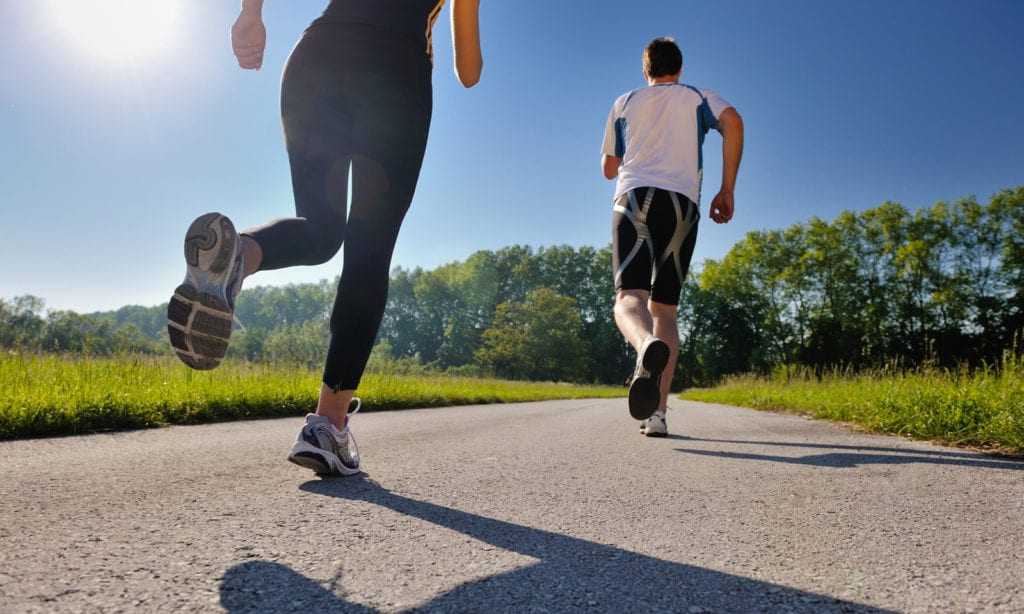Should I Eat Breakfast Before or After a Morning Run?

Exercising regularly is an essential part of day to day life for a lot of people in current times, and a lot of us like to exercise around our daily life, this means exercising early in the morning, or later in the evening around our regular commitments. A lot of people prefer early morning exercising, such as running, as it releases endorphins, which can help improve your mood or keep your mood high throughout the day.
The biggest question a lot of early morning runners ask is, should I eat before I go running or after? Eating before or after a workout may depend on time, intensity and end goals for some people, so we advise reading the below with your end goal in mind, do you want to build muscles while exercising, improve performance, or do you have a weight loss goal in mind instead? The goal may well be different for each runner, but every one of you will need to ensure that you are making the best decision for your health in addition to your end goal.
Which Works Best?
When running early in the day, it is important to ensure that you have enough energy to fuel your body to reduce the chance of injury, you need to ensure that your body has what it needs to sustain an early morning run. Although some of you may be concerned that running on an empty stomach means that you will not have enough stored to fuel your run, you are wrong, providing you have eaten a good meal the night before you can run without eating breakfast. This is because the first thing your body burns is the glycogen stores from the meal you ate the night before your morning run.
So if a fasting morning run is something that you prefer it is perfectly safe to run on an empty stomach, providing you eat a well-balanced meal the night before; we recommend a meal that consists of protein, carbohydrates, and vegetables which will give you enough energy to complete a short to the mid-length morning run. However, if you are planning a long run, you will need to ensure that you take some form of sustenance, with you, to give you energy as you run, stopping midway through to drink an energy or sports drink or use an energy gel will give your body what it needs while you run.
While some will recommend eating after you run other runners prefer to eat before they run, and as there is no firm medical advice to confirm either way – providing you are eating healthy and well-balanced meals throughout the day – you can make the choice that is best for you. It could be a decision you make depending on the distance you plan to run, if you are going for a long-distance run, you may need something more substantial than an energy drink or sports gel, and so eating breakfast before leaving the house can give you the extra energy you need to run long distances.
This can be especially important if you run competitively, where breakfast is an essential meal on a race day. Do ensure that when eating before a run that you also should be eating the right foods to prepare your body for exercise. We are not saying to have a tall glass of soda and a fried breakfast shortly before a run, a balanced breakfast is essential for your body to get the right nutrients from the food you are eating.
One thing to ensure regardless of whether or not you eat before a morning run is that while running, you have enough water with you to ensure you do not become dehydrated while you run. Research into fasting runs shows that runners who do not eat before they run burn more fat during their run while people who eat breakfast before their run may well be able to go a longer distance because of the preparation they have taken.
Timing
The timing of your breakfast is also an important part of the decision of whether or not to eat before or after you run, the best time to try to eat before a run is at least one to two hours before you set out. This allows your body to fully digest what you have eaten and ensure that you get the most from that meal, also you will minimize the risk of you feeling nauseous while running or after you have run due to eating too close to the run.
So, the question you need to ask yourself when making this decision is, Do I have enough time to get up and try to eat a meal one to two hours before I am ready to go for a run? If you do not have time to allow yourself that amount of time to digest before running, we recommend you eat some fruit you like, preferably something that will give increased energy with water to ensure hydration before you run.
Conclusion
Whichever you choose, eating before or after running ensure that you get a calorie-rich meal after running, this will help to replenish the glucose and energy that you have burned while running. If you are reading this and thinking, ‘but I do not like to eat immediately after running,’ then ensure that you have a snack that will begin replenishing what you have lost to hand for when you return home. Foods like chocolate milk and fruit are great snacks for while you are winding down or taking a shower, but as soon as you are able to, you must eat a calorie-rich meal to help yourself recover from the exercise done that morning.